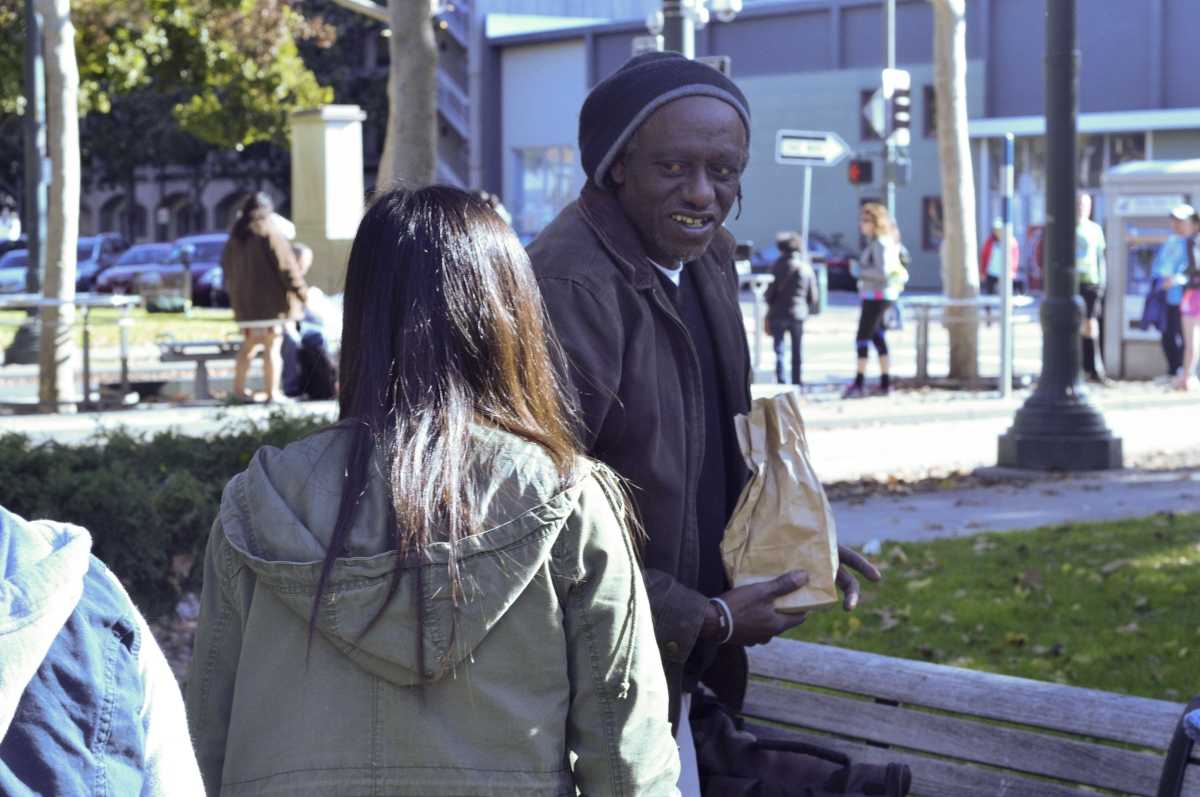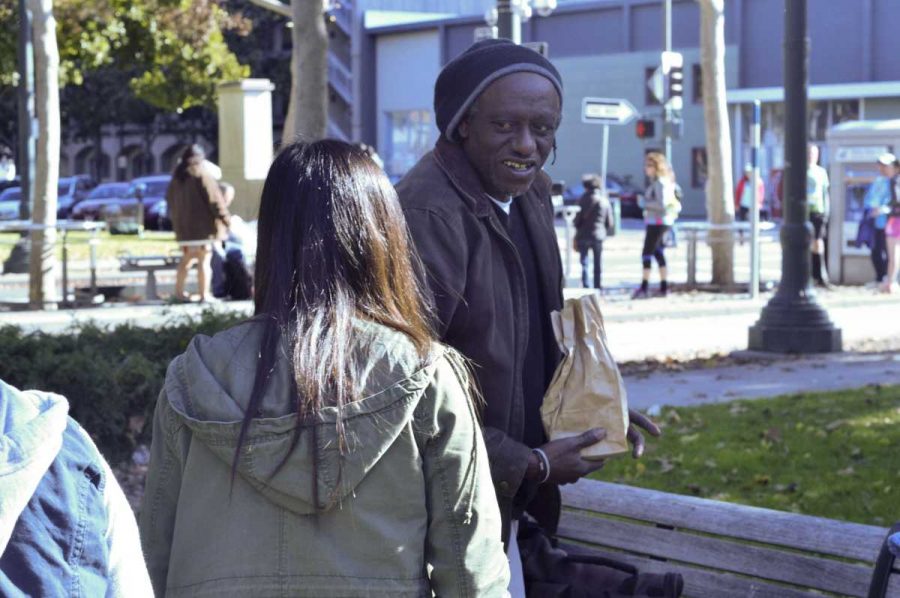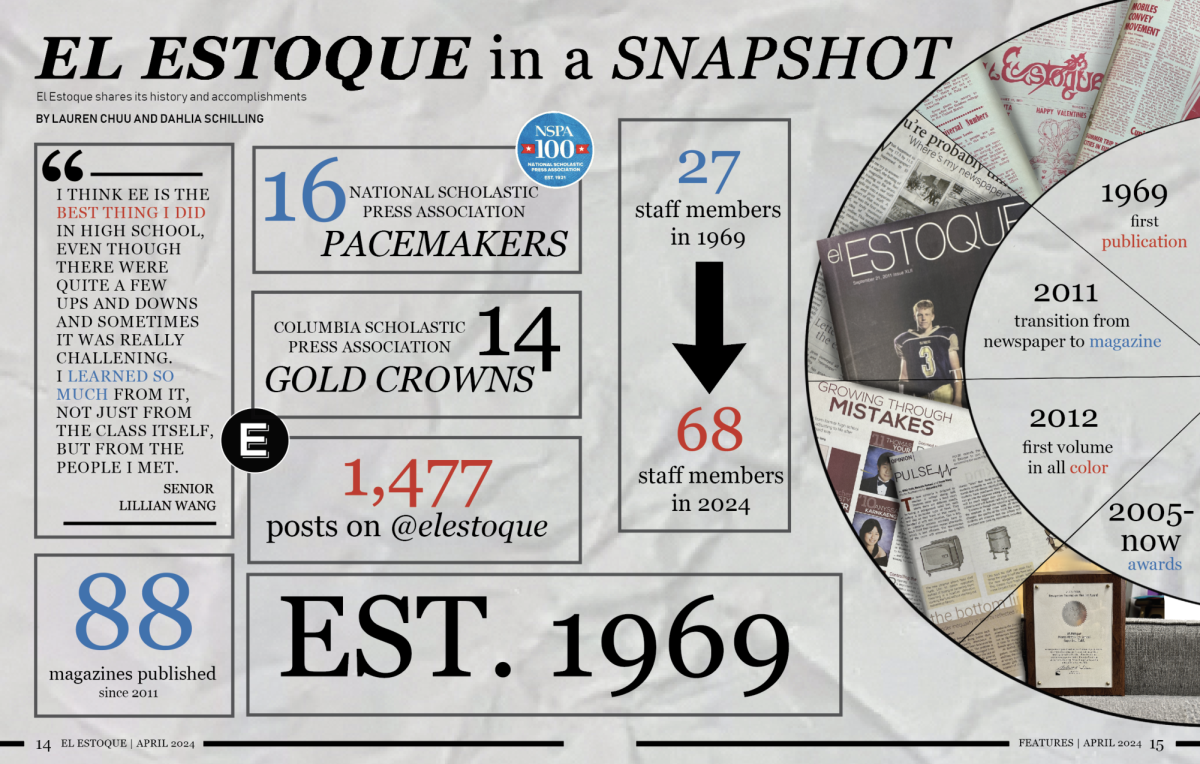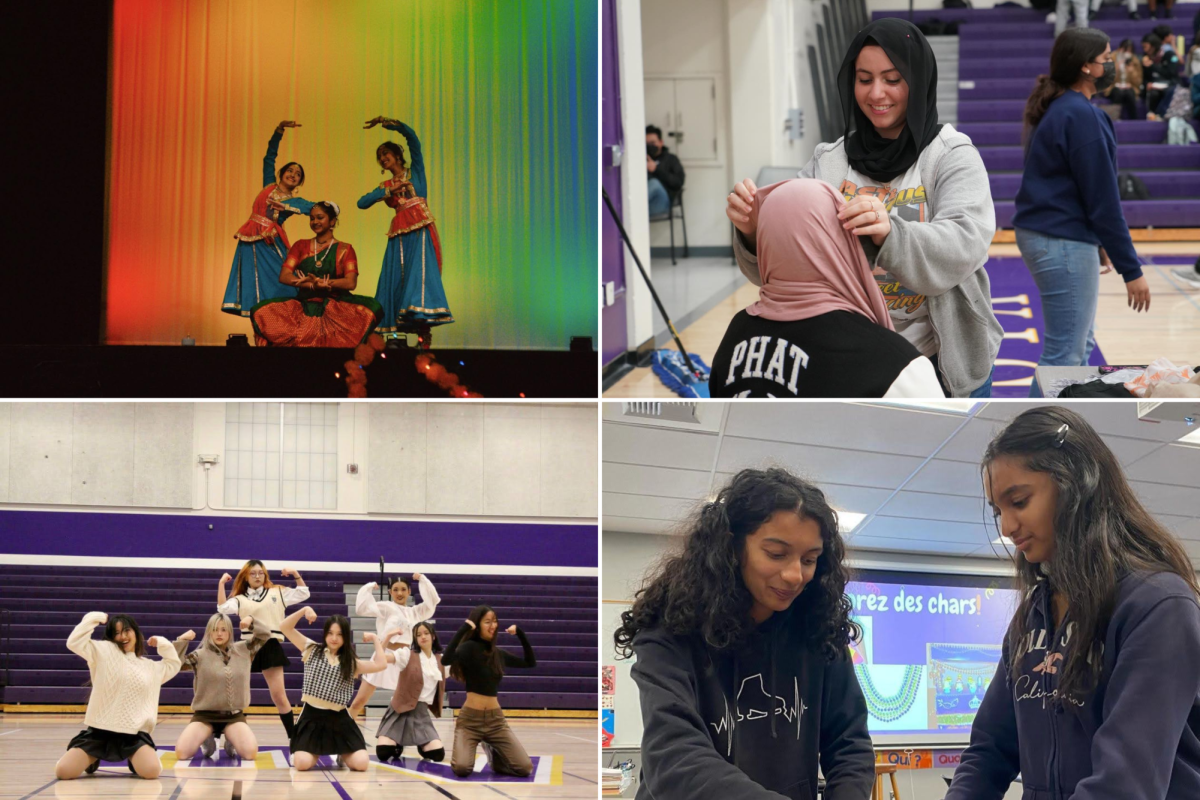


Co-written by Mingjie Zhong.
IF YOU WERE TO WALK IN THROUGH THE DOUBLE DOORS at El Camino Hospital on Grant Road in Mountain View, you would likely come across a broad wooden desk and marble countertop, behind which a wooden backdrop encases the silver letters: INFORMATION. Behind this wooden desk sits three weary computers, usually operated by two to three teenage girls dressed neatly in buttoned gray polo shirts with red “El Camino Hospital” logos embroidered on the chest.
These young receptionists don’t work at the hospital for money. And they don’t spend three hours every other week standing behind the hospital’s front desk, answering a myriad of questions and battling all kinds of erratic scenarios — from a man who claimed he was from prison to a Russian woman who complained endlessly of American wheelchairs — solely to impress colleges. At least, not junior Liana Santos.
“I think volunteering has been a really good experience for me, but I know a lot of people do it just for their records,” Santos said. “Most of the people who came in for the recommendation letter actually ended up loving it and stayed past the time they needed the recommendation letter.”
It’s been almost two years since Santos first started volunteering as a receptionist at the El Camino Hospital front desk. Because she started in the March of her freshman year and was the youngest applicant, she was delegated what she calls, almost affectionately, the “bottom of the heap.” She got the position that no one wanted: front desk receptionist. The other students wanted to work on the Escort Team, delivering flowers, discharging people and occasionally sneaking in poker games or Chipotle in between errands. She was stuck with the shift that no one wanted — Saturday 11 a.m. to 2 p.m., the shift she couldn’t really plan lunch with friends around. But Santos has since grown to love her position, earning her gold 100-hour badge in the mail on Nov. 15, 2015.
And with her 100 hours of volunteer service at El Camino Hospital, Santos certainly has amassed her share of quirky stories to share. She has met all kinds of people at the front desk, from the people who are endlessly angry to the people who come in wrapped in tears and grief.
“I’ve had a lady from Russia say, ‘In Russia we don’t keep our wheelchairs in a closet, we have them out in the public because Russia’s so filled with wheelchairs,’” Santos said. ‘“You Americans are so greedy!’ And she didn’t even need anything. I just had to file a complaint about American wheelchairs.” Santos shrugs her shoulders and laughs, confused at the memory.
Santos also recalls having met a man outside the hospital who claimed he had escaped from prison. Bewildered, Santos called for her boss to help the man — the hospital sent him home on a bus, Santos thinks. But she has also met patients that made a different impression: once, a young girl of six or seven years of age came up to Santos to ask for directions to the hospital’s Psych Ward. Her volunteer experience, Santos recounts, has exposed her to a variety of experiences she might not have otherwise had.
Stop donating, senior Daniel Vu recalls seniors from the Class of 2015 saying back in October 2014. Don’t undermine our win. Don’t donate more to the Homecoming Food Drive.
Vu, a junior at the time, could not tell if the seniors’ reactions to his dedication to his class and contribution to the food drive were real. He watched as seniors flushed red with anger that overtook them as they gazed over overflowing barrels that held food worth over $1000. Food that would be transported to the Second Harvest Bank to help those who really needed it.
It was the seniors’ year to shine and they wouldn’t take losing the homecoming rally to the juniors. That would be unacceptable. Even if it meant fewer hungry people would receive food, the seniors of the Class of 2015 could not bear to lose Homecoming to a junior.
Vu was used to these criticisms, and he simply turned the other cheek. He spent his time carefully selecting the right types of canned foods — the ones that would not only earn his class the most points, but also the ones that would truly help those who needed food and provisions.
“I was helping someone out, but then [the Class of 2015 seniors] were also saying that I shouldn’t because I was trying to undermine their win at homecoming,” Vu said with a sigh. He continues to try to work through the seniors’ mentality of winning being more important than actually helping. “It’s also sad because [the food] is all going to the same place.”
Charity is an interesting phenomena. It involves giving to others through acts of kindness — be it monetary, food or actions. In return, we are gifted with the knowledge that we have helped somebody else in their life.
In an interview with New York Times, Paul G. Schervish, director of Boston College’s Social Welfare Research Institute said: “A lot of people forget the obvious: that unlike taxation, giving is voluntary.”
But with the voluntary notion of charity, students can get their own benefits. With volunteering comes hours of community service and schools that go as far as to require students to fulfill a requirement of service hours. Through volunteering, students can put something that looks good on their college application to help set them apart. Most people volunteer for a combination of reasons, according to Santos.
“No one’s saying: I’m doing this only to help other people,” Santos said. “It’s going to be a mixture of I want to help other people, I want to know I’m helping other people — and [getting] that kind of gratification in yourself.”
However, what drove Vu to donate was the thrill of competition among the four classes — most notably among the classes of 2015 and 2016. Like Santos reasons, Vu did not have a single reason to donate so much to the Homecoming Food Drive: he donated for the exhilarating spirit of class bonding, but also for the recipients of the donated food.

Class bonding is but one of many reasons that people donate. Senior Aaron Chen, co-president of Red Cross, notes that frequently in the face of disasters, more people tend to donate.
“People will tend to feel like they should give to help the people there,” Chen said. “And that’s when you notice feelings and volunteering, blood donations and monetary donations coming in.”
According to Chen, empathy with the victims of life-changing disasters pushes people to reach out and help. But sometimes, giving to a small, local organization is a different experience from giving to larger, national and even international organizations — the latter is more mechanized, less personal. With over a million nonprofit organizations in the United States alone and several charity organizations on campus sometimes giving is not very intimate and personal — an issue more prevalent in larger, national charity organizations like the Red Cross. According to Vu, donating to smaller, more local charities retains a more personal quality as the giver often knows exactly where the money is going and what it is being used for.
Furthermore, in Vu’s opinion, monetary donations are not as helpful as passing out food or performing volunteer work. Vu says he does not usually believe in giving homeless people money and would rather hand out food items, simply because of his own fear that homeless people may use given money for the wrong reasons, such as purchasing drugs or alcohol.
However, Chen finds monetary donations to be the best way that youth can help. According to Chen, because of legality issues, youth can’t do as much as adults can, so money would help more. By the same logic, Chen also believes that adults should be the ones physically doing work.
“We’re missing a lot of adults that can do [volunteering in person],” Chen said. “When people can volunteer their time it’s very helpful.”
But in his sophomore year, Vu learned something new about homelessness. Having just paid for an ice cream in a Palo Alto store, Vu exited with one dollar in change still in his hand. He encountered a homeless man standing outside the small store and decided to offer the one-dollar bill to him. Then Vu left.
But the man called him back. He wanted to say “thank you” to Vu, who initially hadn’t thought much of his gesture of kindness to the man. But the man was sincere and genuine in thanking Vu, even sharing his own personal story. Vu recounts that the man suffered through a divorce with his wife, who received custody of their children; thus, the man lostall he had cared about. When he finally lost his job as well, he took to the streets, living the life of a beggar.
 “[But] there’s a whole other side of homelessness,” Vu said, “that shows there are people who actually want to get out of their homelessness and come back, rebound into society.”
“[But] there’s a whole other side of homelessness,” Vu said, “that shows there are people who actually want to get out of their homelessness and come back, rebound into society.”
To Vu, the best part of helping out the man, or anybody else who needs it is the ability to make them feel good and helping them out.
“It’s sort of selfish, and it kind of defeats the purpose of donating and doing charity,” Vu said. “But I guess you kill two birds with one person and you both help yourself and you help another person.
With this mantra though, Vu would like to do anything that could help the people who need it. Their gleaming, genuine smile is what resonates in Vu’s mind.
Schools do attempt to make students more aware of the situations of people that are not like them. One way that they attempt to do this in is by requiring community service hours.
Getting students out of the house or even compelling them to do anything but study or waste time is hard enough of a task. Many schools, including Harker, Bellarmine and Stratford, require students to complete a minimum amount of service hours. Sophomore Justin Xie, a student at Harker, is required to complete ten hours of community service per year.
As a boy scout, Xie sees no problem in completion of these hours. So, regardless of Harker’s minimum requirement for community service hours, Xie would continue volunteering his time to help others. However, he sees this as an opportunity for others to explore the ways in which they can help others where they may not have been as motivated to do so before.
“I think [having a minimum requirement for service hours] is alright because a lot of other private schools have it too,” Xie said. “It makes people aware of the opportunity and people want to help but are too lazy, so it gets them out of their house to help.”
Vu, on the other hand, is glad that MVHS doesn’t require service hours. Although he knows that this could potentially help the community in general, he notes that students may feel forced into it by the requirement that they have to fulfill. If they felt forced into volunteering, he believes that students wouldn’t put their heart into it.
“I’m in three volunteer clubs and I’d like to say it’s for [a] noble cause,” Vu said. “But there’s an added benefit of being able to put it on college apps.”
One prominent service club on campus is Red Cross; unlike other volunteer clubs, Chen describes Red Cross as being somewhat mission based, where the mission is provided by the official red cross organization — to “prevent and alleviate human suffering”. He believes that the events that other clubs do sometimes aren’t donating or helping those who need it, but in fact just ways to get community service hours to look better on a college application.
Chen can’t help but notice that a primary contributing factor for students in their joining of service clubs is their ability to put their leadership tasks on college applications.
In fact, US News sites community service to be a large emphasis of admissions officers. One of the keys to becoming a well-rounded student.
“I’ve noticed that for some, it’s purely selfish reasons, but I mean the side effect is that it does help people so it’s not entirely bad,” Chen said. “I would like to see people do it out of the kindness of their heart, but that is a bit idealistic.”





















